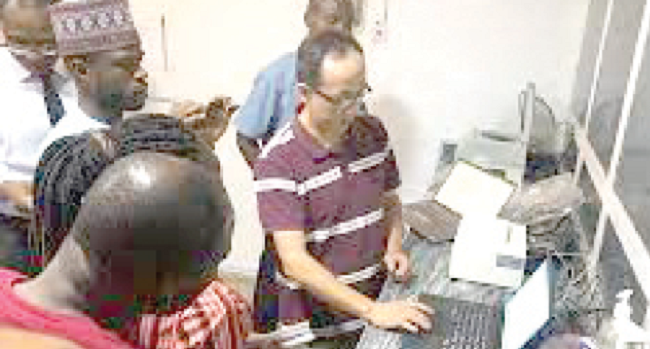WHEN Mrs Olanike Okunnubi, a 40-year-old teacher, heard that the health facility in her locality was offering screening to detect early signs of cervical cancer, she immediately booked for screening at the hospital in Ondo State.
“I seized the opportunity because I had always wanted to check my status, but the price for a pap smear is as high as N25,000. The nurse informed me about the screening and explained the simple process – visual inspection with acetic acid (VIA).
“This involved applying dilute acetic acid – a component of ordinary vinegar – to the cervix and the health worker, with naked eyes, looking for abnormalities on the cervix, which will turn white when exposed to vinegar,” she retorted.
Before the screening, the nurse counselled her about cervical cancer, saying it is preventable if detected early.
All of these could take time, especially if abnormalities are noticed on the cervix, the neck of the womb and then further tests like the pap test, where cervical cells are examined for pre-cancerous changes, are required to rule out a pre-cancer.
But a new cervical cancer screening project at the Institute of Infectious Diseases at the College of Medicine, University of Ibadan, is reducing waiting times for testing from weeks to a matter of minutes, using a new technology.
The equipment, Atila Biosystems, is the first human papillomavirus (HPV) testing equipment in Nigeria. It was received as a grant from Northwestern University, Chicago. It provides simple, fast, cheap and precise means to test for HPV, a common sexually transmitted infection that is linked to cervical, throat and anal cancers.
“Cervical cancer is an uncommon complication of HPV, a commonly sexually transmitted infection. So, detecting HPV is critical,” Professor Isaac Adewole, a principal investigator of the project, said
Adewole, a gynaecologist and former Nigerian health minister, said HPV testing is the World Health Organization (WHO) recommended standard for screening for cervical cancer and the project will be the first to screen women on a public scale in Nigeria for the cancer.
“About 80 to 90 percent of young girls will have HPV within a year of sexual debut and their body will clear off the infection. However, the infection will persist in about 10 percent because their immunity is low or due to the presence of cofactors like smoking and contraceptive pills,” he added.
While the HPV tests look for infection in a sample of cells collected from the cervix, the other screening options, which are the pap smear and the VIA test, look for pre-cancerous changes in the cells of the cervix which can develop into cervical cancer.
Professor Adewole declared, “rather than wait for the pre-cancerous changes in the cells of the cervix, we can now pick the HPV infection, which occurs much earlier. Now, we will also be able to determine if it is the type of HPV with a higher chance of turning into cancer.
“There are about 100 types of HPV and not all of them are known to lead to cancer. The few that can lead to cervical cancer include types 16, 18, 33, 35, 41 and 63. Individuals with these high-risk types need to be followed up to ensure they do not end up with cervical cancer.”
Dr Oludare Morhason-Bello, also a principal investigator of the new cervical cancer screening project, said studies in Nigeria have detected HPV in other parts of the body, like the anus and the throat.
“A lot of people now engage in oral sex, putting them at risk of developing oral HPV infection. In fact, one in 10 sexually active Nigerians that we collected samples from in Ibadan had HPV infection. Among sex workers, it was one in five,” he said.
Morhason-Bello said this forms the basis of another study at the university, in partnership with the Northwestern University, Chicago, to look at the effect of the environment on the genetic configuration of people that may develop mouth and throat cancers among people living with HIV.
Aside from this, he declared that the cervical cancer project is also contemplating allowing women to do their test by themselves, to take away embarrassment, pain, discomfort and stigma around cervical cancer, reasons many women refuse cervical screening.
Dr Morhason-Bello declared that in collaboration with Northwestern University, College of Medicine at the University of Ibadan, University of Jos and two other universities in Mali, will commence a pilot study to test the introduction of self-sampling in the detection of HPV in the clinic.
He added, “Women will take their swabs, which are then run through the machine. The test result can reveal whether the virus causing cervical cancer is in the sample in less than an hour, thereby eliminating the problem of loss to follow-up in the community. It will improve confidentiality and early detection which is crucial for cervical cancer. Treatment in an early stage will also avoid it progressing to a cancer.”
“Any woman that has had sex once is at risk of having HPV, so it is expected that at least women should regularly screen for cervical cancer and the best detection method is HPV testing. Therefore, if we can deploy this technology and the result can be out within an hour, then we can quickly decide if the person will need further assessment and possible treatment.”
Morhason-Bello, also a gynecologist, declared that currently, the greatest challenge to preventing cervical cancer cases in low and medium-income countries is poor access to screening services, since women who are already sexually active may not benefit from the protection the HPV vaccine offers against the cancer.
He added, “The overall benefit of all of these is a reduction in the incidence of cervical cancer in Nigeria; a country can only be said to have eliminated this cancer if it detects less than four cases per 100,000 women per annum. Currently, 80 percent of cervical cancer cases are discovered in advanced stages when they cannot be cured.”
According to him, ensuring population screening is pivotal to stemming increasing cases of cervical cancer in low and medium-income countries.
Youxiang Wang, whose company developed Atila Biosystems, said “That is what Atila Biosystems offers; it is portable, requires no highly trained laboratory technician for its operation and can be battery powered; meaning it can be used even in remote areas and a large batch can be processed all at once within a short time. Of course, its result is comparable with other forms of HPV tests and, in fact, self sampling by the women makes it more efficient for population screening.”
Director, Centre for Global Oncology, Northwestern University in Chicago, Professor Lifang Hou, declared that women are vulnerable to many things, including cancer, thus the need to educate them on the scientific means of preventing cervical cancer.
“They need to understand the harm HPV can cause to the woman’s cervix, the anus and the throat. They have to take the HPV test; in fact, those with HIV have a higher risk for HPV and, therefore, cervical cancer. If they don’t know, they have HPV; it can develop into real cancer. Once cancer develops, it is really hard to cure,” she said.
Professor Adewole said that the HPV vaccine and early detection significantly lower the risk of cervical cancer.
He said the HPV vaccine will prevent girls from contracting the disease in the near future, making it one of the most preventable forms of cancer.
He declared that Nigeria is keying into the international agenda to stem cervical cancer even as it commences vaccination of young people by September, starting in 16 states in the first phase and 14 states in the next phase.
Adewole added, “We want them vaccinated before they are 14 and then we will then be able to make sure that at least 90 percent of girls are vaccinated with the HPV vaccine by the age of 15; 70 percent of women are screened using a high-performance test 10 years apart and at least 90 percent of women with pre-cancer treated, and 90 percent of women with invasive cancer managed.”
He said ideally, if there are resources, both young boys and girls should be vaccinated against HPV, adding, however, that “if all girls are vaccinated, then it will also protect the boys, because once the girls are protected, even if the boys meet them, there cannot be any infection.”
Professor Adewole assured of the safety of the HPV vaccine, declaring that it has been in use in developed countries for over 15 years and has not been found to cause any harm.






